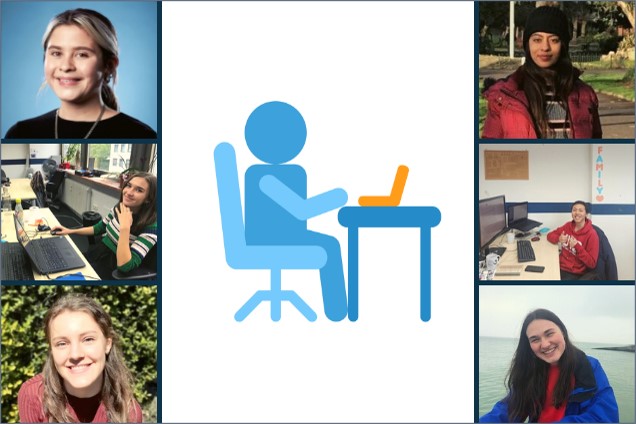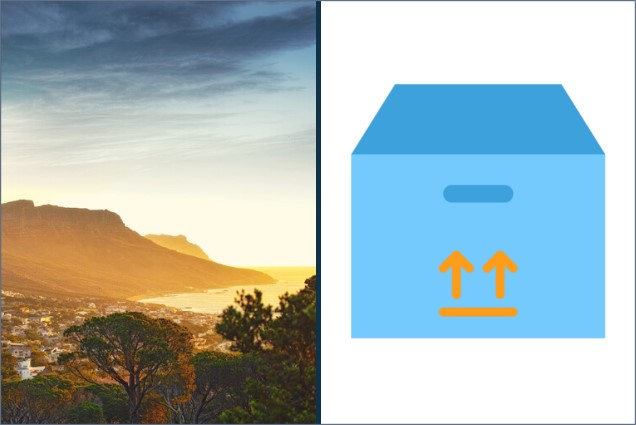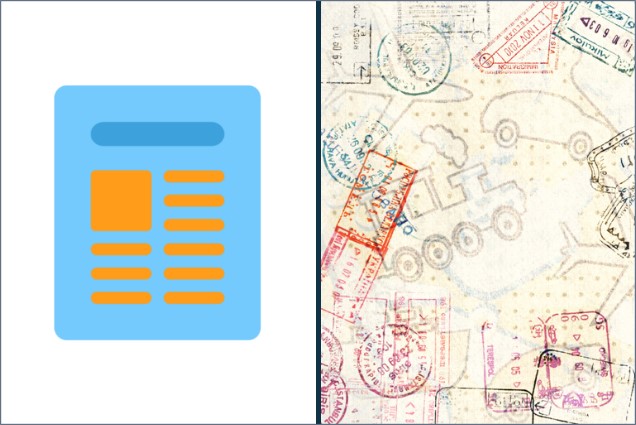An exchange of opinions between Jane, Team Lead Corporate Communications at InterNations, and Senior Content & Communications Manager Elena on the pros and cons of remote work.
[Read more…] about Do be honest now: Would you like to return to the office?My Internship Experience: Of Team Trips & Self-Exploration
In this guest article, our Social Media Intern Gabriela looks back at her time at InterNations and the many learning opportunities that her internship provided.
Does everyone else really have their lives all figured out? In the second year of my sociology degree, it was time to apply for mandatory internships. And it seemed like everyone already had their futures sorted out, while I still felt incredibly lost.
But I reminded myself that the third year of my studies was actually meant for that: to gain professional experience and to better understand what career path to choose after university. So, I decided to open myself up for something new. I would look for something I could possibly imagine myself enjoying as a full-time job and just try it out.
[Read more…] about My Internship Experience: Of Team Trips & Self-ExplorationSeeking Opportunities Abroad: My Internship
In this guest post, our Corporate Communications Intern Patricia looks back at the past six months at InterNations, sharing what she learned during her internship abroad.
As a business student at the Swiss German University in Jakarta, Indonesia, I traveled far from home. There were two reasons why I came to Germany: to attend part of my double-degree program at the Fachhochschule Südwestfalen in Soest and to do a six-month internship abroad.
[Read more…] about Seeking Opportunities Abroad: My InternshipWhy I Moved 9,100 Km to Become a Better Business Leader
In this guest post, InterNations Founder Malte explains why he decided to rejoin the expat community, moving to Cape Town in autumn 2021, and what he’s learned so far. He discusses his experience with relocating and settling in, especially with making new contacts abroad.
Taking a Walk in Someone Else’s Shoes
Moving to South Africa not only meant putting my walking shoes back on. It also means putting myself into our members’ shoes.
After founding InterNations in 2007, I settled down in Munich. In the following 14 years, we grew the business into the world’s largest network for expats and global minds. But despite our success, it makes a huge difference if you’re running an expat community as a German local — or if you’re gaining more experience on the ground.
Relocating to Cape Town wasn’t just the ultimate exercise in customer-centric thinking. I also had other, personal reasons for taking this step. In my earlier career as an international TV reporter, I’d often lived abroad. After more than a decade in Germany, I found myself missing expat life.
It’s also an adventure to explore another culture and a whole new country as a family. Our horizons have expanded vastly since we came to Cape Town. Living abroad changes your perspective, sometimes radically so. I wouldn’t want my kids to miss out on this amazing opportunity.
South Africa: The Perfect Expat Destination for My Family
We specifically chose South Africa for various reasons. I wanted to keep working remotely with the InterNations Team. Most of our team members still live in Germany. To keep the time difference to a minimum, this left me with all of Europe and Africa to choose from.
But I had already lived in several European countries and traveled to many more. So, I was looking for a very different kind of expat experience.
I’d been to South Africa before, most memorably to visit our local InterNations Communities back in 2016. Cape Town is one of the most beautiful cities I’ve ever seen: great location, high quality of life, perfect climate. Making the decision to live here for a while couldn’t have been any easier.
The Road to Relocation, with a Few Bumps along the Way
We managed most of the relocation process on our own. Looking back, I’m not sure if this was the right way to go.
Sorting out our visas was the biggest challenge, even without a language barrier to worry about. If we ever move outside the EU again, I’ll definitely consider getting help with visa applications. If you can afford it, just let the professionals take care of it. It will save you a lot of hassle.
Other parts of relocating went really smoothly in comparison, especially finding accommodation for our family. Of course, this depends a lot on the local housing market. In Munich, the housing search can be a bit of a nightmare, and we’d been rather worried.
Fortunately, there are plenty of opportunities to find decent accommodation at reasonable prices in Cape Town. Many people let apartments or entire houses as vacation homes. Since tourism has been affected by COVID-19, they’ve been switching to long-term rentals. So, the relative ease of finding housing was a pleasant surprise.
Preparing for the Move in Theory and in Practice
While you’re preparing for your move, reading up on your destination helps you gain insights into its history and culture. Personally, I really enjoy biographies, memoirs, and books about politics.
Nelson Mandela’s The Long Walk to Freedom was obviously a must-read. I also recommend Born a Crime: Stories from a South African Childhood by Trevor Noah. In his account of growing up as a child from a (then illegal) interracial relationship, Noah — a TV host and comedian — presents a very serious topic with a funny touch.
In more practical terms, asking other expats for advice is the best kind of support you can get. Luckily, a good friend of mine moved from Germany to Cape Town about ten years ago. She knows the area very well. It’s been an invaluable help to get first-hand information about the best neighborhoods, the right schools, and potential safety issues.
Cape Town has a bit of a reputation for being unsafe. I must admit I was a little concerned, after living in Munich — one of Germany’s safest cities — for so long. As newcomers, we needed to adjust our routines, which took some getting used to. Knowing which neighborhoods to avoid, remembering not to go for a walk after dark, and so on.
But all in all, settling down in South Africa has been easy. So far, nothing has put a damper on my general satisfaction and my optimism about life in Cape Town.
How to Win Friends and Influence People — Abroad
Relocating to another country always comes with various challenges, not just with regard to paperwork. Making new friends is probably the biggest. Whenever you move, you need to rebuild your personal and professional support network from scratch.
Fortunately, I’ve already met plenty of new people in Cape Town. I’ve obviously attended several events hosted by the local InterNations Community. Being a father helps too. You’ll automatically meet lots of other parents at your kids’ school or on playdates.
It also helps that I’ve been a member of the Entrepreneurs’ Organization (EO) for years. It’s an international peer-to-peer network that is organized in local chapters. It has provided me with easy networking opportunities in Cape Town. At local events for entrepreneurs, we can share experiences, discuss challenges, and mentor each other.
Most EO members are South Africans, while the contacts we’ve made through our children’s school are mainly other German expats. Through InterNations, I’ve encountered people from all walks of life, with a wide range of backgrounds and nationalities. I would describe my social circle as a great mixture of private and business contacts, of expats and local residents.
Generally speaking, the best thing you can do to make new friends abroad is to be both proactive and persistent. None of the people here have been waiting for you to show up. They’re all leading rich and busy lives. It’s up to you to make the first move and then keep things going.
Reliving the experience of organizing an international move and settling down abroad reminded me of what our members are experiencing every day. It’s really true that you can’t understand someone until you’ve walked at least a mile in their shoes.
Image credit: Getty Images / InterNations / iStockphoto
Remote First: The Interns’ Perspective on Our New Policy
There are usually several interns at InterNations, working in various teams from Corporate Communications to Corporate Partnerships. Our current interns have written about their internship experiences in times of COVID-19, about what they have enjoyed and what they hope for future generations of remote-first interns.
While we have embarked upon our internships at InterNations, many changes have been getting underway. The fluctuating COVID-19 levels, followed by the new remote-first policy, meant there has been a loss of the stability that comes with the daily routine of going into the office. However, there are also many positive aspects about remote work: more free time instead of commuting, spending less money on lunch and transportation, and more flexibility in working hours, to name a few.
Here’s what we think about our remote(ish) internships, with all their pros and cons!








